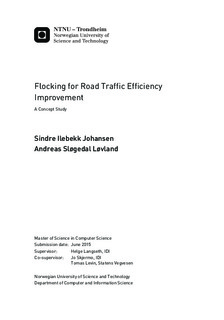Flocking for Road Traffic Efficiency Improvement - A Concept Study
Master thesis
Permanent lenke
http://hdl.handle.net/11250/2352328Utgivelsesdato
2015Metadata
Vis full innførselSamlinger
Sammendrag
This thesis presents a concept study into the viability of flocking as a future road traffic management system for automatic vehicles. The idea is to remove the road lanes and let the vehicles themselves decide on the most effective road usage by dynamically allocating road space for either driving direction. The dynamic allocation achieved through flocking is more efficient than, e.g., lane barriers or traffic lights for changing direction of dynamic lanes.
Flocking requires each vehicle to follow a set of steering behaviors that, when followed by all vehicles, will result in emergent behavior.
In this study, we have implemented a road segment in Unreal Engine 4, along with multiple different vehicles to test the performance of flocking on diversified and homogeneous asymmetric road traffic. We have also performed some experiments to test flocking on homogeneous symmetric road traffic.
Our results show that flocking is a viable option for future road traffic management, and the emergent behavior is able to dynamically allocate road space as needed.
Further, the results show throughput on a 20m wide road can be increased by 72% with diversified asymmetric traffic, and 56% with homogeneous symmetric traffic. We believe some of the throughput increase is due to automatic vehicles being more effective than human drivers and not solely the achievement of emergent behavior.
